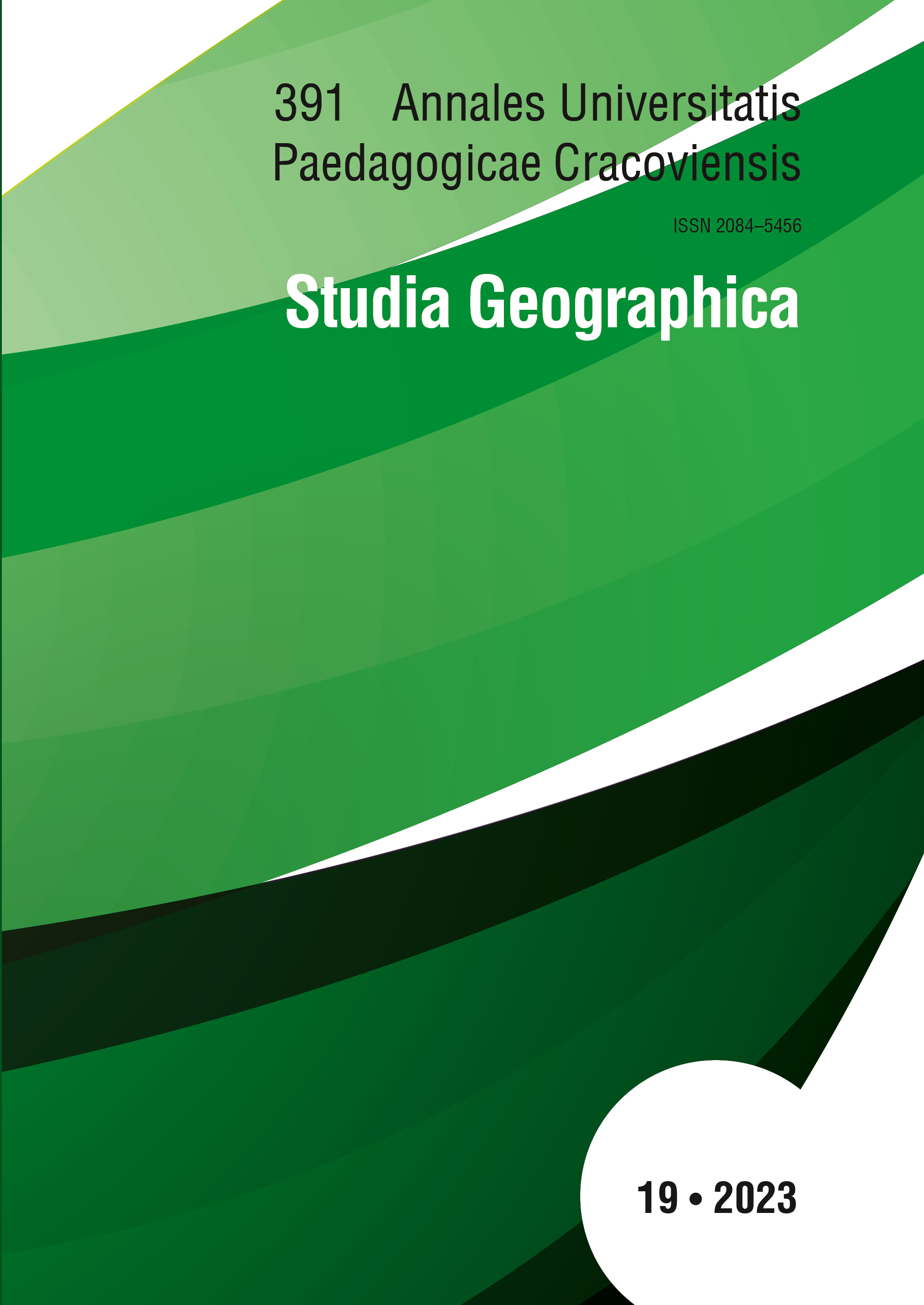Development of sports clubs and sports infrastructure in the area of the city of Krakow in spatial terms
DOI:
https://doi.org/10.24917/20845456.19.6Abstract
Soccer is seen as an important part of Krakow’s social and cultural life. This is due to the long‑standing traditions associated with the sport, which are rooted in the city’s history. Initially, soccer in Krakow had an amateur dimension. The first mentions of a more organized form of practicing this form of sport date back to the times under the Partitions of Poland. After the restoration of independence, soccer began to evolve, which was associated with the professionalization of the clubs’ sports activities. Club activists from Krakow were important figures in directing the development of soccer and sports infrastructure, not only in the city, but throughout the country. During the interwar period, there was a phenomenon of demographic, cultural and economic development of the city, which translated into the dynamic development of sports at that time. In the second half of the 20th century, the new political system in Poland, resulted in a reorganization of sports management in the country. The changes at the time, translated into the picture of the functioning of sports, among other things, club activities became heavily dependent on industrial plants. After the period of transition associated with political changes after 1989, the functionality of many clubs (especially multi‑section clubs), became much more difficult by cutting off funds flowing from state‑owned factories. Today’s situation has changed, not least due to improvements in the city’s economy, as well as Poland’s participation in the European Union community. The ability to obtain funds from the Union, for regional development, allows for many more options for sports‑related investments. An important element in the development of professional soccer, has become club sponsorship. A good example of successful sponsorship is the two most successful clubs in Krakow – Wisla Krakow and Cracovia. Both teams have gained, above all, financial stability and progress in sports performance.
References
Broniewski, S. (1959). Kopiec wspomnień. Kraków: Wydawnictwo Literackie. 85 lat Małopolski związek piłki nożnej w Krakowie. (2005). Katowice: Wydawnictwo GiA.
Chemicz, S. (1982). Piłka nożna w okupowanym Krakowie. Kraków: Wydawnictwo Literackie.
Hajduk, F. (2013). Funkcje Sportu, wybrane problemy. Rocznik Lubuski, 39/ 2, 252–260.
Kukulski, J. (1988). Pierwsze mecze pierwsze bramki. Kraków: Wydawnictwo Literackie.
Kowalski, Ł. (2010). Sport w przestrzeni miejskiej. Kraków: Uniwersytet Jagielloński.
Mańkowski, J.D. (2022). Społeczne czynniki upadku i trwania klubów sportowych w okresie transformacji ustrojowej w Polsce. Gdańsk: Uniwersytet Gdański.
Mydel, R. (1994). Rozwój urbanistyczny Krakowa po drugiej wojnie światowej. Kraków: Secesja.
Przynoga, A. (2012). Propaganda w Sporcie w PRL na przykładzie Wyścigi Pokoju 1948–1989. Poznań: Uniwersytet im. Adama Mickiewicza.
Smarzyński, H. (1958). Henryk Jordan. Kraków: Państwowe Wydawnictwo Naukowe.
Trzepacz, P. (2020). Stadion piłkarski w przestrzeni miasta: przemiany lokalizacji dużych obiektów infrastruktury piłkarskiej. Kraków: Uniwersytet Jagielloński.
Waśkowski, Z. (2007). Uwarunkowania i sposoby wdrażania orientacji marketingowej w klubach sportowych. Poznań
Wilczyński, P., Synowska, K. (2014). Jakość rozgrywek lig zawodowych piłki nożnej w Polsce a ich finansowanie. Kraków: Oficyna wydawnicza AFM.
Woźniak, W. (2013). Zawodowe amatorstwo? Futbol w okresie PRL w relacjach polskich piłkarzy. W: M. Kazimierczak, J. Kosiewicz (red.), Sport i turystyka. Uwarunkowania historyczne i wyzwania współczesności. Poznań: Akademia Wychowania Fizycznego im. Eugeniusza Piaseckiego w Poznaniu.
Włodarczyk, B. (2016). Łódź jako arena wielkich wydarzeń sportowych – wybrane przykłady. Łódź: Uniwersytet Łódzki.
Netografia:
Historiawisly.pl. www historiawisly.pl, data 01.06.2022
Wikipasy.pl. www.wikipasy.pl , data 01.06.2022
Downloads
Published
Issue
Section
License
Copyright (c) 2024 Annales Universitatis Paedagogicae Cracoviensis Studia Geographica

This work is licensed under a Creative Commons Attribution-NoDerivatives 4.0 International License.
The submission of a paper to be published is synonymous with an agreement to transfer the copyright free of charge from the author to the publisher. The author also agrees to permit the publisher to publish the paper in printed form, open access online form, digital library form and other digital platforms with which the publisher has or will have a publishing agreement. Furthermore, the author agrees to not limit the number of copies that may be printed or issued by the publisher. In the case of co-authored papers, it is assumed that the corresponding author is authorized to represent the remaining co-authors in this respect. Authors are requested to sign a copyright declaration.

